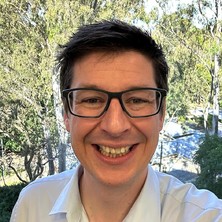
Overview
Background
Dr Will Anderson is a Research Fellow at The University of Queensland, specialising in molecular diagnostics, nanoparticle characterisation, and translational device development. His current work focuses on developing diagnostics for single molecule quantitation and low-cost, accessible technologies for nucleic acid analysis.
Dr Anderson has over 15 years of R&D experience spanning academia and industry, with expertise in:
-
Nanopore sensing and nanoparticle analysis
-
Nucleic acid extraction and quantification
-
Diagnostic device prototyping and point-of-care platforms with a focus on fluorescence-based detection
-
Research translation, IP strategy, and regulatory frameworks
Dr Anderson’s work bridges fundamental research and real-world application, with a strong focus on enabling diagnostic innovation through mechatronics, assay development, and collaborative industry engagement.
Availability
- Dr Will Anderson is:
- Available for supervision
Fields of research
Qualifications
- Bachelor of Biotechnology (Honours), The University of Queensland
- Doctor of Philosophy, The University of Queensland
Research impacts
Dr Will Anderson’s research bridges device design, physical chemistry and molecular biology to improve how we detect and measure biomolecules and nanoparticles in diagnostic and research settings.
Diagnostic Device Design Dr Anderson has developed accessible molecular diagnostic technologies that reduce cost and complexity at the point of need. These include:
-
The open-source DIYNAFLUOR, a low-cost DNA fluorometer used in field-based environmental DNA studies and STEM education program. https://github.com/traulab/DIYNAFLUOR
-
Patented, rapid, low-cost nucleic acid extraction methodology.
-
A Commericaly developed prototype point-of-care qPCR platform for rapid, decentralised testing.
Nanoparticle Characterisation and Physical Chemistry Dr Anderson’s PhD and postdoctoral research advanced nanopore and optical sensing methods to measure the size, charge, and concentration of nanoparticles such as exosomes and liposomes.
-
His published work is widely cited in the fields of biophysics and nanomaterials (>2100 citations)
-
He contributed to the development of a nanoparticle characterisation facility at UQ used by dozens of researchers
-
His comparative benchmarking studies on particle sizing platforms remain a go-to starting point for both industry and academia
Works
Search Professor Will Anderson’s works on UQ eSpace
2011
Journal Article
Quantitative sizing of nano/microparticles with a tunable elastomeric pore sensor
Vogel, Robert, Willmott, Geoff, Kozak, Darby, Roberts, Seth G., Anderson, Will, Groenewegen, Linda, Glossop, Ben, Barnett, Anne, Turner, Ali and Trau, Matt (2011). Quantitative sizing of nano/microparticles with a tunable elastomeric pore sensor. Analytical Chemistry, 83 (9), 3499-3506. doi: 10.1021/ac200195n
2010
Journal Article
Tunable nano/micropores for particle detection and discrimination: Scanning ion occlusion spectroscopy
Roberts, G. Seth, Kozak, Darby, Anderson, Will, Broom, Murray F., Vogel, Robert and Trau, Matt (2010). Tunable nano/micropores for particle detection and discrimination: Scanning ion occlusion spectroscopy. Small, 6 (23), 2653-2658. doi: 10.1002/smll.201001129
2010
Journal Article
Use of tunable nanopore blockade rates to investigate colloidal dispersions
Willmott, G. R., Vogel, R., Yu, S. S. C., Groenewegen, L. G., Roberts, G. S., Kozak, D., Anderson, W. and Trau, M. (2010). Use of tunable nanopore blockade rates to investigate colloidal dispersions. Journal of Physics: Condensed Matter, 22 (45) 454116, 1-11. doi: 10.1088/0953-8984/22/45/454116
Funding
Past funding
Supervision
Availability
- Dr Will Anderson is:
- Available for supervision
Looking for a supervisor? Read our advice on how to choose a supervisor.
Supervision history
Completed supervision
-
2021
Doctor Philosophy
Nanoparticle tracking and trapping using computerised feedback control
Associate Advisor
Other advisors: Professor Matt Trau
Media
Enquiries
For media enquiries about Dr Will Anderson's areas of expertise, story ideas and help finding experts, contact our Media team:
